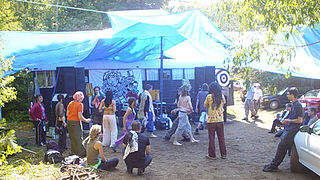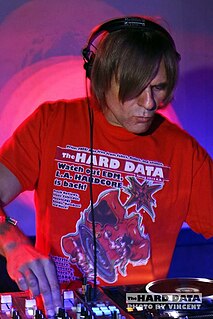House music is a genre of electronic dance music created by club DJs and music producers in Chicago in the early 1980s. Early house music was generally characterized by repetitive 4/4 beats, rhythms provided by drum machines, off-beat hi-hat cymbals, and synthesized basslines. While house displayed several characteristics similar to disco music, which preceded and influenced it, as both were DJ and record producer-created dance music, house was more electronic and minimalistic. The mechanical, repetitive rhythm of house was one of its main components. Many house compositions were instrumental, with no vocals; some had singing throughout the song with lyrics; and some had singing but no actual words.
Breakbeat hardcore is a genre of hardcore music of the late 1980s and early 1990s that combines four-on-the-floor rhythms with breakbeats, and is associated with the UK rave scene. In addition to the including of breakbeats, the genre also features shuffled drum machine patterns, upbeat piano rolls and old-school hoover sounds.

A rave is an organized dance party at a nightclub, outdoor festival, warehouse, or other private property typically featuring performances by DJs, playing a seamless flow of electronic dance music. DJs at rave events play electronic dance music on vinyl, CDs and digital audio from a wide range of genres, including techno, hardcore, house,, bassline, dubstep, New Beat and post-industrial. Occasionally live performers have been known to perform, in addition to other types of performance artists such as go-go dancers and fire dancers. The music is amplified with a large, powerful sound reinforcement system, typically with large subwoofers to produce a deep bass sound. The music is often accompanied by laser light shows, projected coloured images, visual effects and fog machines.

Freetekno is a cultural movement that is present in Europe, Australia and North America. Freetekno sound systems or tribes form in loose collectives, frequently with anarchist philosophies. These sound systems join together to hold parties wherever a viable space can be found – typical locations include warehouses, fields, abandoned buildings or forests. Because freetekno parties are usually held illegally this sometimes leads to clashes with the police, as was the case at both the 2004 and 2005 Czechtek festivals and many other, smaller parties around the world at different times.
Intelligent dance music is a form of electronic music originating in the early 1990s, which was regarded as "cerebral" and better suited to "home listening" than dancing. Emerging from electronic and rave music styles such as Detroit techno, acid house, ambient music, and breakbeat, IDM tended to rely upon individualistic experimentation rather than adhering to characteristics associated with specific genres. Prominent artists associated with the genre include Aphex Twin, μ-Ziq, the Black Dog, the Orb, the Future Sound of London, Autechre, Luke Vibert, Squarepusher, Venetian Snares and Boards of Canada.
Joey Beltram is an American DJ and record producer, best known for the pioneering recordings "Energy Flash" and "Mentasm" and for remixing Human Resource's "Dominator".
Hardcore is a subgenre of electronic dance music that originated in the Netherlands from the emergent raves/gabber in the 1990s. Its subgenres are usually distinguished from other electronic dance music genres by faster tempos, the intensity of the kicks and the synthesized bass, the rhythm and the atmosphere of the themes, the usage of saturation and experimentation close to that of industrial dance music.
Altern-8 is a British rave duo, featuring Mark Archer and Chris Peat. Best known in the early 1990s, their trademark was loud electronic tracks with a heavy bass line. On stage and in music videos, such as that for "Evapor-8", Altern-8's members wore facemasks and chemical warfare suits. The band was signed to Network Records based in Stratford House, Birmingham, England.
Speedcore is a form of hardcore that is characterized by a high tempo and aggressive themes. The genre was created in the early to mid 1990s and the name originates from the genre hardcore as well as the high speed tempo used. This music rarely drops below 300 beats per minute (bpm). Earlier speedcore tracks often averaged at about 250 bpm, which could be defined as terror(core), whereas some tracks sometimes exceed 1000 bpm where it then becomes known as extratone, the world's fastest music genre.
Bouncy techno is a hardcore dance music rave style that developed in the early 1990s from Scotland and North England. Described as an accessible gabber-like form, it was popularised by Scott Brown under numerous aliases. The sound became prominent in the northern United Kingdom rave scene before it broke into the hardcore homeland of the Netherlands through Paul Elstak, where it became known there as happy hardcore and funcore.
Free tekno, also known as freetekno and hardtek, is the name given to the music predominantly played at free parties in Europe. The spelling of the word tekno is made to deliberately differentiate the musical style from that of techno. The music is fast, normally 170 to 200 bpm and characterised by a pounding repetitive kick drum. Nevertheless, bass drum distortion by clipping is used less often as in the related genre of mainstyle hardcore. Nowadays, some tekno producers also use drum sets that rather sound trancey, since many members of the tekno subculture as well as the psytrance subculture frequently attend the same raves and the two scenes are closely connected.
Drum and bass is a type of breakbeat hardcore that originated in the UK that emerged from the countries jungle scene in the early 90s. The genre would go on to become one of the most popular genres of electronic dance music, becoming international and spawning multiple different derivatives and subgenres.
Rising High Records was a leading British record label, established in 1991, specializing in rave, techno and ambient chillout music. Founded by Caspar Pound, who had had chart success with a Homeboy, a Hippie and a Funki Dredd, the label went on to be at the forefront of dance music in the 1990s. The label was formed at F2 studios in London with studio owner Rob Mcluhan. Pound had recorded "Total Confusion" at F2 and decided to form his own label in partnership with the studio, teaming up with the in-house producer Pete Smith to form The Hypnotist. The label's first release "Rainbows in the sky" became an instant hit and was quickly followed by "The House Is Mine" and "Hardcore You Know the Score", three tracks that defined the sound of techno through the decade. Vocals and samples for all three were provided by Andy Higgins who also ran the export and production of the label in the early years, according to Colin Larkin in The Guinness Who's Who of Rap, Dance and Techno.
DJ Sharpnel is the collective alias for Japanese electronic artists Jea and Lemmy. Via their dōjin label Sharpnelsound, they release albums consisting of their own speedcore, gabber, happy hardcore and trance works as well as guest tracks from acquaintances of the group, such as DJ Chucky, m1dy, and M-Project.
Together were an English electronic/rave group, best known for their hit single "Hardcore Uproar", which made number 12 in the UK Singles Chart in August 1990.
World Traveller Adventures is a collection of four movies featuring the adventures of new age rave travellers - Spiral Tribe, Desert Storm, Sound Conspiracy, Teknokrates, Tomahawk and IOT. Including "23 Minute Warning", "Storming Sarajevo", "Mission to India", "Africa Expedisound", and bonus: "Reclaim the Streets". The DVD was released by Uncivilized World studio in October 2005.

Joel Bevacqua is an American rave DJ, music producer, promoter, and writer known as DJ Deadly Buda. He is also known as the graffiti artist “Buda”. He is a recognized pioneer in both graffiti and rave culture. Originally from Pittsburgh, Pennsylvania, he is credited by authors Roger Gastman and Caleb Neelon in their, "The History of American Graffiti" as being "Pittsburgh’s first graffiti superstar" and inventor of the “monster rock style” of graffiti lettering. He is also recognized for instigating Pittsburgh's rave scene in 1991. In 2005 part of his techno dance music collection was a notable acquisition of the US Library of Congress: Motion Picture, Broadcasting and Recorded Sound Division.







